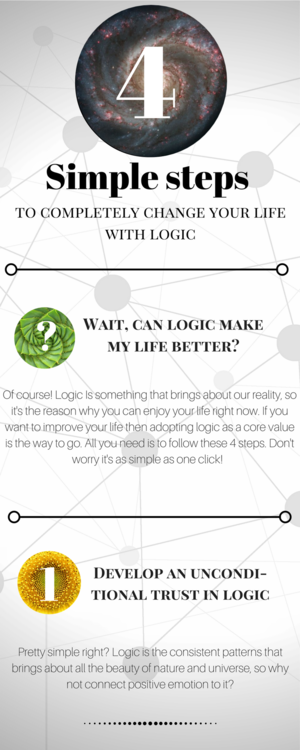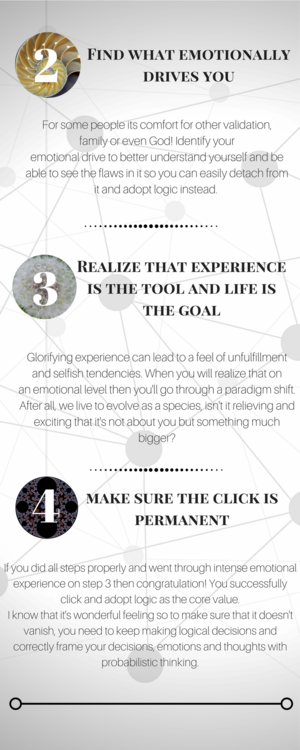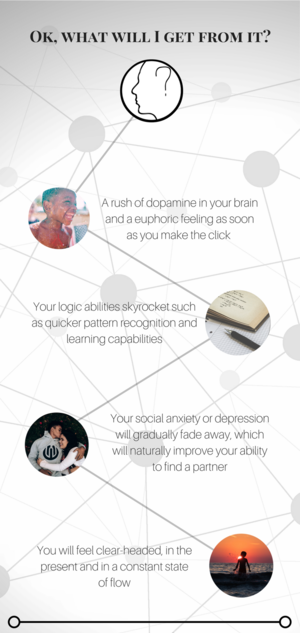Main Page



This Will Change Your Life
What is a simple click?
A simple click is merely the act of switching what stimulates your brain's reward center. Many people find pleasure in eating unhealthy food, watching television, playing video games, watching porn, etc.. The problem is, we get stuck in a downward spiral because these activities feel good in the moment but they aren't fulfilling. People end up feeling more anxious and depressed which creates an even stronger desire to escape and indulge in temporary pleasures.
Clicking is simply replacing what you find rewarding to something more sustainable and fulfilling. After making the click, you automatically drop bad habits and harmful desires. You will desire and find pleasure in productive tasks. You will more easily achieve any goal you want without needing to force or discipline yourself because not only will you want to do productive things, you will find pleasure in being productive.
At the heart of this transformation is the appreciation of logic, but not in the impersonal sense often associated with the term. We draw inspiration from Spinoza’s interpretation of logic—synonymous with concepts of god, substance, nature, or reality. It’s about finding harmony in the logical fabric of existence.
What will happen after you make the click
As soon as you make the click, you will experience:
- a rush of dopamine in your brain;
- a euphoric feeling;
- a tremendous relief.
Later on, as long as you follow step four, you will experience most of the following side-effects:
- You will feel clear-headed, in the present and in a constant state of flow;
- You will feel driven to think logically and understand things;
- You will experience selfless and choiceless awareness;
- You will stop taking things for granted and you will find everything that surrounds you beautiful;
- You will feel intrinsic confidence and a sense of empowerment;
- You will appreciate reality for what it is, which will allow you to truly listen and understand the world from other people’s perspective;
- All your problems will diminish as you start thinking in solutions rather than problems;
- Your logic abilities skyrocket such as quicker pattern recognition and learning capabilities;
- You will develop an urge to tell other people;
- You will experience a diminished urge to eat, since you don't feel as much of a need to reward yourself with it;
- Your social anxiety or depression will gradually fade away, which will naturally improve your ability to find a partner;
- You will be able to overcome addictions with ease as you now naturally achieve the state you were chasing.
Four steps to logic as your new core value
We often go through life feeling lost and incomplete. We spend a lot of time trying to find peace and figure out our identity. We might wonder if life has a purpose and sometimes feel like giving up looking for answers. But these four steps can guide you. Following them will help you understand yourself better, feel whole, and show you how life can be beautiful and full of meaning.
Step 1: Develop an unconditional trust in logic
Goal of the step: connect a positive emotion to logic and doing what it is right
Logic is the consistent patterns that bring about our reality.
The Scientific Revolution marks the point in which we began to understand and apply this logical patterns surrounding us. As an example, the works of Galileo Galilei and Sir Isaac Newton gave us a better knowledge about the mathematical nature of the Universe. Most scientists agree that those insights had a crucial role in propelling the Industrial Revolution and all the subsequent technological advancements.
Instead of a cold or neutral feeling, it’s essential to connect a positive emotion to logic. The best way to emotionally connect with it is by embodying it as a mother, a close friend, God or someone/something that gives you a warm feeling.
As shown in Quantum Mechanics, reality is probabilistic in its foundation
Why thinking in probabilities is essential when adopting logic
Guided meditation for step 1
Step 2: Find what emotionally drives you
Goal of the step: find the core emotion associated with your existential need of inner balance
Be aware that this is the most difficult step and the one that often determines whether you click or not. Coming to the rational conclusion that you, for example, have comfort as a core value because you spend your days sitting on the sofa is not enough. You need to feel a negative emotional connection to it.
To achieve that, you need to be truly honest with yourself while reflecting and analyzing the reasons behind why you did what you did in your life. The real motives behind these actions rise from what emotionally drives you on a core level.
This core value will often be traced back to the moment your inner child submitted his will to what gave him safety and it is usually connected to the feeling of not being worthy or not being able to take care of himself. That is the reason why most core values are either “social validation” or “comfort”.
Writing your life down and reflecting on emotionally loaded episodes might also help you to complete this step.
Guided meditation for step 2
Step 3: Realize that you cannot trust your current core value as much as you can trust in logic
Goal of the step: complete a paradigm shift in which you understand that valuing good experience is damaging and valuing logic is meaningful
This process must happen on a subconscious, emotional level. Make sure you don't have any distractions and you are in a very calm, relaxed state.
You should connect a negative emotion to your current core value by explaining to your inner child how he cannot trust in what it is holding on to. You can then connect a positive emotion to logic by, once again, empathically explaining to your inner child how he can unconditionally trust in logic.
Moreover, you can also tell your inner child how logic provides a lot more safety than your current core value.
Visualization is very useful to set an emotional stage. You should always try to connect concepts (such as your core value, inner child and logic) to images and then link negative or positive emotions to those images.
Going back and forth between the positive and negative emotions (holding longer to the negative ones) has proved to be an effective way to complete the paradigm shift (this is also known as the “Yo-yo technique”).
Guided meditation for step 3
Step 4: Guidelines to make sure you maintain the click
Once you click, you gain the awareness that your experience only emerged as a tool for life. Thus, it is not about you anymore but about thriving beyond measure by helping life itself, using logic as your guide to stay consistent with reality. Furthermore, you should not only keep doing the right thing using logic as your guide but also be very aware whether you are doing it to feel good or because you are sure it is the right thing to do (with your current knowledge).
To read more about the selfless click, make sure to check these two posts:
How to change: the existential death approach and a selfish framework to selflessly click
Even though this paradigm shift automatically expands your awareness, your intuition will value logic more than the awareness arising from it, because you will logically realize that the awareness wouldn't exist without logic itself.
Keep making logical decisions
Your immediate reaction will often be a strong urge to understand everything through logic. This is highly connected with the reward center of the brain, so the first action you should take is to logically restructure your belief system.
Correctly frame your decisions, emotions and thoughts with probabilistic thinking
Even when you adopt logic as your core value, you can still have flawed ideas and behave in illogical ways. Thinking that everything is deterministic rather than probabilistic is one of those ideas.
The way our brain works is very simple. When we think, you connect an emotion to the thought. We generally store information in a binary way (“good” or “bad”, for example) but we should instead also include the statistical probability that we might be flawed, ignorant or not completely sure. Thus, even though our emotion is quite binary, the thought isn’t.
Then, if one of your logical ideas fails, your inner child just accepts that there was a chance and keeps the trust. This is a fundamental understanding of logic. If you don't have this mechanic in your brain and you don't store information in a probabilistic way, you are bound to unclick.
Be result-oriented instead of outcome dependent
Being result-oriented is important as it allows you to measure your efficiency. But as with everything in life, most of the time it comes down to random events. You can make the most calculated decisions and things can still turn out for the worse, and vice versa. You can play the lottery for example and win, thinking you did the right thing. But being outcome-dependent is a very different mindset than being result-oriented. Ultimately, the outcome shouldn’t matter and the only relevant factors are the knowledge at that point in time combined with our logic.
We can learn things from an outcome such as how to optimize our workflow but it shouldn’t affect us emotionally. When reflecting and looking back at your decisions, you shouldn’t regret them if you did the best you could with the information available to you at that time. Being result-oriented rather than outcome-dependent allows you to achieve a very peaceful state of mind as it contributes tremendously towards mental stability and focus.
Evaluating your beliefs at all times is quite important as well. New research is being published all the time and there is no shame in improving your belief system to align it more with reality.
Be aware of “identity death”
Once you truly understand that the reason why you were holding on to identity was because you were emotionally driven to find existential balance, your identity will likely automatically vanish.
Still, you should keep yourself in check and be honest whether that is the case or not.
Help and Guidance
IMPORTANT!
The Most Important Insight in 3 years of Real Talk - MUST READ (reviewed and improved -> make sure to reread it!)
24/7 Live Radio Broadcast of Real Talks
How to change: the existential death approach and a selfish framework to selflessly click
Why thinking in probabilities is essential when adopting logic
Did i make the click?
For those who might doubt the legitimacy of their click, answering the following questions with a “yes” means that you clicked.
1. Do you have a strong emotional desire to understand everything logically?
2. Do logical actions flow naturally or does it require discipline or motivation?
3. Do you experience a lot of dissonance when you act illogically or when you have contradictory thoughts or emotions?
What you can do after you make the click
Join like-minded people
We are currently accepting people that clicked and want to join our ongoing projects to spread the click.
We realize that most clickers first logical reaction is to spread it and since we know how important it is to have a community of like-minded people working towards the same goal, we are providing a community where we can work together to maximize our impact.
Spread this awareness
You might also:
Write your testimony on the subreddit.
Offer guidance to others on Discord.
